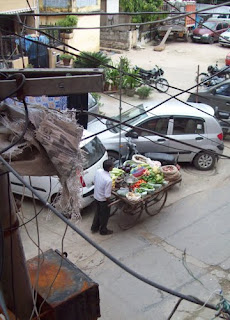
It was typical, I think, of the work of my friend JPji--expansive, optimistic and hugely collaborative.
He has been encouraged and partially funded to develop a series of curricula for non-violence and peace training for the schools in Tamil Nadu. The curriculum here is largely secular and career-focussed (there is high competition among students for higher education and equally high levels of depression and even suicide). He and Ananthi had already hastily put together a book of lessons about peace and peacemaking for the elementary levels but, in part since I was here, he decided it was now time to take the next step and produce a work for the high schools.
So he convened a two day meeting and invited the young Swiss (Steiner Trained) pedagogue Georg as well as David (the architect), Ananthi and several local teachers to develop the basic materials. Three of the teachers are form a network of Montessori schools run in Madurai, another was from another private school in the city. We spent the first day brainstorming on lesson possibilities from the expansive list of topics that JPji (and I) had generated: Holistic Health and Individual Excellence, Interrelationships, Environment and Nature, Nonviolence and the Spiritual Dimension, and The Contemporary Challenges.
I must say it was wonderful fun and enlightening. The Montessori school is obviously working at a very high level, and its curriculum already contains many lessons and ideas in these areas. The young principal told us, for example, of the many uses of circle teaching with students. One is called 'open house' where students identify a problem in their school and then try to generate solutions. The girls recently spoke of the poor condition of the washrooms and, with the janitor present, worked out the details of how it could fixed. A small but wonderful example of student democracy! But they also have highly developed curriculum on bullying, diversity training (Indians really are masters of this) and general health and well-being. On the later, they send the students first to interview their grandparents and parents on their eating habits and food from the past, then identify the changes in what they eat today, developing a critique of commercially produced food. Their cafeteria has only homemade food and the children are allowed to work in it, learning practical skills. When the teach on the environment they assign students to research and then role-play the various animal species, convening what Joanna Macey calls a "Council of all Beings"
So the brainstorming led to some very positive lesson ideas. Tomorrow we will each present a couple of sample lessons on one of the sub-topics and then we will try to collectively write the book over the next month.
I thought of so many possibilities during the conversation and was so stimulated by their enthusiasm, I am still reeling a bit. I would not normally have thought of writing curriculum but the enthusiasm was so strong and the desire to have an impact so real that I feel quite taken up with it.




